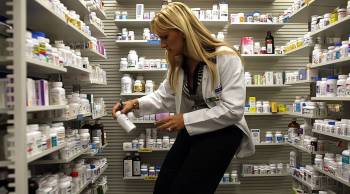Doctors get hooked on drug companies
KAI RYSSDAL: Would it surprise you to know there’s a very good chance your doctor’s being wined and dined by the makers of the drugs you’re being prescribed?
We’ve known for years doctors now have . . . close . . . relationships with drug makers. All those free samples they give out have to come from somewhere, after all. But according to a survey being published in tomorrow’s New England Journal of Medicine, nearly all physicians report some type of relationship with the pharmaceutical industry. That’s everything from free food and drink to having the drug industry pay for what’s considered “professional services.” Here’s Marketplace’s Bob Moon.
BOB MOON: What’s a little bubbly between friends?
[SOUND: Cork pop, pouring champagne]
It seems 4 out of 5 doctors recommend it — or specifically, 83 percent report receiving some kind of food or drink from the pharmaceutical industry.
Under the medical profession’s self-imposed rules, such gifts are supposed to benefit patient care. Despite recent pressure to avoid conflicts of interest, 94 percent of practicing physicians report some type of relationship with the drug companies.
Some have been reimbursed for continuing medical education. Others got paid for “consulting.” Some got free lunches, or free samples aimed at promoting new drugs to patients.
Harvard professor Eric Campbell is one of the study’s authors.
ERIC CAMPBELL: I don’t have any doubt that some forms of these relationships, like giving samples and providing lunch, has a positive influence on drug companies’ ability to market their drugs and services. Because if it didn’t, they wouldn’t do it.
The study didn’t address what types of relationships are appropriate versus inappropriate. Campbell says that’s a question doctors still need to answer.
CAMPBELL: I think it’s really up to the profession to continue to struggle with, you know, which of these relationships are acceptable and which are not, based on the benefit that they provide to the patients.
Campbell also suggests that patients need to add their voice to the debate as well.
I’m Bob Moon for Marketplace.
There’s a lot happening in the world. Through it all, Marketplace is here for you.
You rely on Marketplace to break down the world’s events and tell you how it affects you in a fact-based, approachable way. We rely on your financial support to keep making that possible.
Your donation today powers the independent journalism that you rely on. For just $5/month, you can help sustain Marketplace so we can keep reporting on the things that matter to you.


















